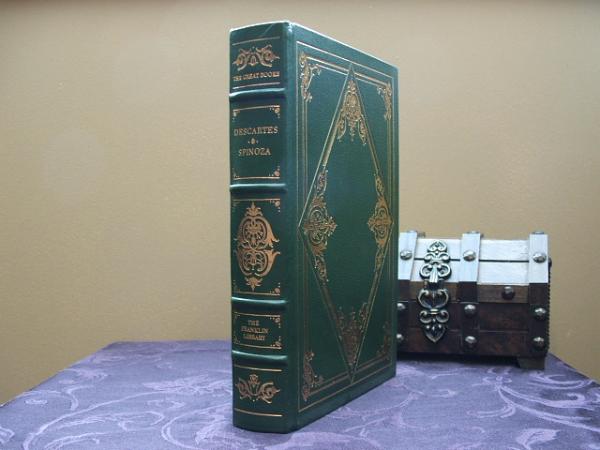Easton Press Baruch Spinoza books
Benedict de Spinoza - Great PhilosophersFranklin Library Baruch Spinoza books
Works of Rene Descartes and Baruch Spinoza - Great Books of the Western World - 1982
Baruch Spinoza biography
Baruch Spinoza, also known as Benedict de Spinoza, was a pioneering philosopher of the Dutch Golden Age, whose ideas continue to shape philosophical discourse to this day. Born on November 24, 1632, in Amsterdam, Spinoza's life was marked by intellectual curiosity, profound insight, and a steadfast commitment to reason and ethics. Raised in a Sephardic Jewish family of Portuguese descent, Spinoza received a traditional Jewish education, studying Hebrew scripture and Talmudic law. However, his voracious appetite for knowledge led him to explore a wide range of philosophical and scientific ideas, including the works of René Descartes and the emerging scientific theories of his time.
Spinoza's intellectual journey culminated in the publication of his magnum opus, Ethics, in 1677. In this monumental work, Spinoza sought to provide a comprehensive account of the nature of reality, human existence, and the principles of ethical living. Drawing upon his background in mathematics and metaphysics, Spinoza developed a rigorous system of thought grounded in rationalism and monism. At the heart of Spinoza's philosophy is the concept of "substance," which he defined as that which is self-existent and independent. According to Spinoza, there is only one substance, which he identified with God or Nature, and everything else—minds, bodies, and material objects—is merely a mode or expression of this underlying substance. Spinoza's philosophy also emphasized the importance of understanding and mastering one's emotions as a pathway to ethical living. He argued that by cultivating a rational understanding of the world and striving to align one's actions with the dictates of reason, individuals could achieve a state of inner peace and harmony.
Despite the revolutionary nature of his ideas, Spinoza's work was met with hostility and condemnation from religious and political authorities. His rejection of traditional religious doctrines and his unorthodox views on God and morality earned him a reputation as a heretic and a dangerous subversive. In 1656, Spinoza was excommunicated from the Jewish community of Amsterdam, an event that had a profound impact on his life and intellectual development. Forced to fend for himself, Spinoza earned a living as a lens grinder while continuing to pursue his philosophical inquiries in relative obscurity. Despite his marginalization, Spinoza's ideas exerted a significant influence on subsequent generations of philosophers, including the Enlightenment thinkers of the eighteenth century and the existentialists of the nineteenth and twentieth centuries. His uncompromising commitment to reason, his radical vision of God and nature, and his ethical idealism continue to inspire and provoke debate among scholars and thinkers across the globe.
Baruch Spinoza passed away on February 21, 1677, leaving behind a legacy of intellectual daring and moral courage that continues to resonate with seekers of truth and wisdom to this day. His enduring contributions to philosophy and ethics ensure his place as one of the most important figures in the history of Western thought.

Comments
Post a Comment
Share your best book review and recommendation